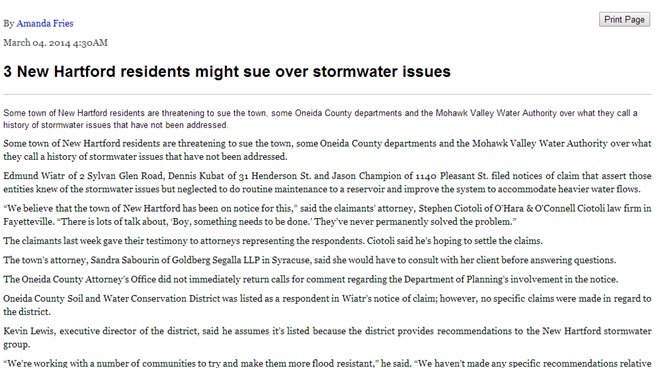Spring has arrived and though the winter snowstorms are over, they’ve been replaced by rainstorms that bring with them several inches of storm water. Urban flooding can often be pointed to the large amounts of water that fall during these spring and summer rainstorms. The problem is so widespread that local governments often have storm water tax to pay for various stormwater solutions.

The problem is that sometimes these solutions are not as thorough as some people want them to be. This often results in disappointment and anger that can lead to legal action. A good example of this is a recent article from the Utica Observer-Dispatch from the New York area describing a group suing the local government for faulty storm water solutions.
Wiatr — who lives near South Reservoir near the Utica-New Hartford border — points to a box culvert purportedly owned by the Mohawk Valley Water Authority as one of the causes for the backup near his Sylvan Glen Road property.
His notice of claim asserts that the authority failed to use the right materials and built a box culvert (a structure that allows water to flow under a road, railroad, trail or similar obstruction) that was inadequate for the volume of runoff in the area.
Ciotoli said there is a box culvert near the area that is designed to handle water run off, but it’s not big enough.
Dealing with storm water is a priority for many local governments because of the damage it can cause and the health danger it poses. In terms of physical damage, the flooding caused by storm water can result in hundreds of thousands of dollars in losses. Additionally, storm water can be a major source of pollution. Sewage and garbage join with storm water runoff and reach local water sources like streams and rivers. This can lead to environmental damage and a health hazard for the local community.
Well-made storm water solutions like those created by StormChambers.com and others are effective ways to deal with the danger. Additionally, consulting with experts would help local governments avoid mistakes in construction and maintenance that could lead to lawsuits like the one mentioned above.
(Source: 3 New Hartford residents might sue over stormwater issues, March 4, 2014)





